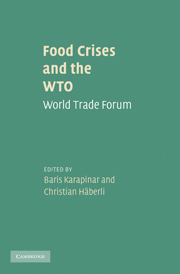Book contents
- Frontmatter
- Contents
- List of contributors
- List of figures
- List of tables
- List of abbreviations
- Preface
- 1 Introduction: food crises and the WTO
- PART 1 Economics of the food crisis
- 2 The food price crisis, poverty and agricultural trade policy
- 3 Globalisation of agriculture and food crises: then and now
- 4 Solving the food crisis in Africa: achieving an African Green Revolution
- 5 Rising food prices: causes, consequences and policy responses
- 6 Shift and swing factors and the special role of weather and climate
- PART 2 Trade and law: WTO and beyond
- 13 Conclusions and policy recommendations
- Index
- References
3 - Globalisation of agriculture and food crises: then and now
from PART 1 - Economics of the food crisis
Published online by Cambridge University Press: 12 May 2010
- Frontmatter
- Contents
- List of contributors
- List of figures
- List of tables
- List of abbreviations
- Preface
- 1 Introduction: food crises and the WTO
- PART 1 Economics of the food crisis
- 2 The food price crisis, poverty and agricultural trade policy
- 3 Globalisation of agriculture and food crises: then and now
- 4 Solving the food crisis in Africa: achieving an African Green Revolution
- 5 Rising food prices: causes, consequences and policy responses
- 6 Shift and swing factors and the special role of weather and climate
- PART 2 Trade and law: WTO and beyond
- 13 Conclusions and policy recommendations
- Index
- References
Summary
Déjà vu all over again?
Introduction
In the first half of the 1970s food prices skyrocketed, leading to concerns about social and political stability in food-importing developing countries, about the fate of the poor in general, and even about whether the world had reached the ‘limits to growth’ and the ability to feed itself in the following years. The international system moved into action and the first World Food Conference was convened in Rome in 1974 under the auspices of the Food and Agriculture Organization of the United Nations (FAO). A three-point plan was approved, including:
the establishment of a food bank, which would offer access to about 10 million tonnes of stored grain;
the creation of the International Fund for Agricultural Development (IFAD), a new financial institution specialised in agriculture, committing US$ 5 billion every year for ten years to improve agriculture (more than three times the level of world investment at the time); and
a new food forecasting system providing early warning of future crises.
Also, the International Monetary Fund (IMF), the World Bank, and the regional banks implemented special programmes to alleviate the short-term financial impact on the balance of payments and fiscal accounts, and to invest in the long-term factors of production. Food entered the diplomatic debate as another possible instrument of negotiation and coercion among nations. More generally, at the end of the 1970s, negotiations were under way on a large number of International Commodity Agreements that tried to stabilise prices.
- Type
- Chapter
- Information
- Food Crises and the WTOWorld Trade Forum, pp. 49 - 80Publisher: Cambridge University PressPrint publication year: 2010
References
- 4
- Cited by



